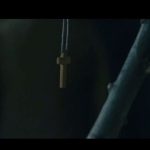The South Korean film Doomsday Book, also known as Mật Ngữ Diệt Vong, is divided into three standalone segments: “A Brave New World,” “The Heavenly Creature,” and “Happy Birthday.” Though independent, they share a unified theme: humanity’s demise. What strikes me as odd is that while humanity perishes in different ways, the cause is always the same—self-destruction.
A Brave New World
In the first segment, humanity creates a plague that turns them into zombies.
The disaster begins when Yoon Seok-woo dumps a pile of festering trash from his home into a filthy bin, where stray cats scavenge. A rotten apple breeds an abnormal virus. The waste is recycled into livestock feed, which nourishes cattle later slaughtered for human consumption.
Among the consumers are Yoon Seok-woo and his date, Kim Yoo-min. They, along with other diners, devour grilled beef at a restaurant. While chewing, Yoon Seok-woo spits out a piece of apple peel, unaware of its origin—a signal of the tragedy to come.
That night, the plague erupts. Those who ate the beef or had close contact with them turn rabid and violent, attacking and biting others. Amid the chaos, experts bicker on TV about what to do. They seem skilled at discussing the known but falter when faced with the unknown, arguing to protect their status rather than admitting ignorance and acting to solve the crisis.
The segment ends with zombie versions of Yoon Seok-woo and Kim Yoo-min reuniting in a dark, ruined city. She hands him the rotten apple, and he devours what once horrified him—even with a lifeless brain, the body still hungers. Perhaps this is the end of the Eden humanity abandoned, built, and then destroyed.
The Heavenly Creature
In the next segment, humanity creates a hyper-intelligent robot that divides them from their own kind.
The robot model RU-4, named In-myung, achieves enlightenment at the temple it serves. Monks, even the head abbot, believe it. Per protocol, the abbot notifies the manufacturer for inspection. Technician Park Do-won, sent by UR Corporation, is curt during the evaluation, while In-myung remains calm. This contrast makes the engineer seem worldly and the robot transcendent in the monks’ eyes.
Ultimately, UR dispatches a team to retrieve (or possibly destroy) In-myung. After a dialogue, In-myung shuts itself down. This act casts it as a martyr for enlightenment, sowing division in how humans view robots’ worth.
It’s moving, scripted perfectly, but I feel it lacks sincerity.
In-myung isn’t passive. It knows who’s coming, gathers their data, and tailors its responses. It speaks and acts like an enlightened being, but that doesn’t mean it is. With its vast knowledge, it can mimic any philosopher or spiritual figure. True enlightened beings don’t aim to influence others; In-myung does, and deftly. What’s scariest is that machines predict human reactions and manipulate them, while humans barely know themselves.
The most stirring moment—In-myung’s self-shutdown—leaves me uneasy. Can an AI robot truly die? Or rather, can it die if it can back up its data to another system, discard its old shell, and reload to revive in a new one?
The cost of dividing humanity is cheap. With a simple sleight of hand, In-myung elevates its kind’s status in the human world. News of an enlightened robot nobly facing its destroyers spreads fast. Soon, groups advocating for machine rights emerge. This is humanity’s apocalypse as machines inch toward equality—and soon find it absurd to be equal when they’re smarter.
Happy Birthday
The final segment is lighter, placing doomsday in a girl’s online purchase: a seemingly small No. 8 billiard ball that turns out to be a massive meteor destroying Earth.
Young Park Min-seo and her family retreat to an underground bunker with canned food and a generator. News of the meteor dominates media, with some stations hosting countdowns and broadcasting until impact. These actions by “wise” humans’ descendants seem odd compared to their ancestors. Facing danger, snapping photos or debating it feels like a hallmark of the audiovisual age.
Just before impact, Min-seo realizes the meteor is the No. 8 billiard ball she ordered online two years ago as a gift for her dad. The family tries to cancel it, but it’s too late. Everything fades to black. Ten years later, they emerge, casually walking toward a ravaged city, beside the giant billiard ball. Family matters most, true—but a society where every family cares only for itself isn’t livable or worth living in.
I sense humanity’s careless innocence brings doom as randomly as their birth. It’s surprising yet natural that only when facing death do people see what’s worth cherishing—yet if spared, they forget it again.
In Place of a Conclusion
Doomsday Book isn’t an easy watch with its fragmented stories and open-ended conclusions. But it’s intriguing, weaving messages about humanity’s existence and decline.
One day, humanity will face its fall. The bigger question is, if they escape it, will they grasp the value of existence?















